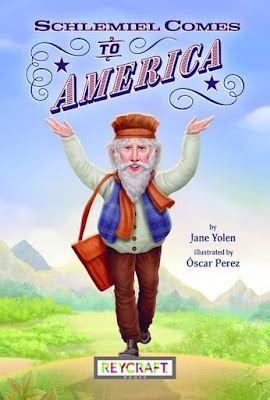Review: Schlemiel Comes to America
Schlemiel Comes to America
by Jane Yolen, illustrated by Óscar Perez
Reycraft Books, 2023
Category: Picture Books
Reviewer: Cindy Rivka Marshall
Buy at Bookshop.org
Children who delight in silliness, especially the silliness of adults, need look no further than
Chelm - a legendary place in Poland where all the people are fools. In the folklore, the people of Chelm take advice from the “wise men” of Chelm who lead their town further into absurdity. Thus the word “wise” is turned on its head to equal “most foolish.”
After briefly introducing some classic Chelm anecdotes, author Jane Yolen departs from the usual folklore and tells of a Chelmite who gets fed up and leaves Chelm. He especially cannot tolerate the foolishness of his neighbors when they carry, rather than roll, a large boulder down a mountain. Yolen cleverly names her protagonist Schlemiel, a Yiddish word that means fool. However, in a fun reversal, this schlemiel is surprisingly bright. In fact he does not suffer fools gladly. Schlemiel decides to go to America. He reasons it is so far from Chelm, there will surely not be so many fools. When the realistic illustrations by Óscar Perez depict what looks like the early 1900’s New York City, this book becomes something of an immigration story.
Once in America, Schlemiel encounters two men who are digging holes but don’t know what to do with the piles of dirt. Schlemiel convinces them to senselessly dig an even bigger hole in which to place the dirt from the first hole. Obviously, this does not solve the problem. But these nincompoops happily pay him copper, silver and gold coins for his advice. Here, Schlemiel takes on the role of a “wise man of Chelm.” We see that Schlemiel is not a fool…but perhaps he is a gonif? (Yiddish word for thief!)
Schlemiel is content to be in America where he discovers “not all the fools in the world live in Chelm.” I suspect Jane Yolen of winking at the reader, intimating that, indeed, there are many foolish deeds to be found in America in these times.
People of all backgrounds, young and old, will find amusement in this tongue in cheek story. The secular Jewish content in this book is drawn from the humor and rich folklore of Eastern European Jews. As Jane Yolen points out in the back matter, many cultures have similar folklore about characters and places full of fools. Jews in the diaspora borrowed from the cultures in which they found themselves, and interwove that lore with their own. This book shows that Jews, like many others, can enjoy laughing at themselves.
Children who delight in silliness, especially the silliness of adults, need look no further than
Chelm - a legendary place in Poland where all the people are fools. In the folklore, the people of Chelm take advice from the “wise men” of Chelm who lead their town further into absurdity. Thus the word “wise” is turned on its head to equal “most foolish.”
After briefly introducing some classic Chelm anecdotes, author Jane Yolen departs from the usual folklore and tells of a Chelmite who gets fed up and leaves Chelm. He especially cannot tolerate the foolishness of his neighbors when they carry, rather than roll, a large boulder down a mountain. Yolen cleverly names her protagonist Schlemiel, a Yiddish word that means fool. However, in a fun reversal, this schlemiel is surprisingly bright. In fact he does not suffer fools gladly. Schlemiel decides to go to America. He reasons it is so far from Chelm, there will surely not be so many fools. When the realistic illustrations by Óscar Perez depict what looks like the early 1900’s New York City, this book becomes something of an immigration story.
Once in America, Schlemiel encounters two men who are digging holes but don’t know what to do with the piles of dirt. Schlemiel convinces them to senselessly dig an even bigger hole in which to place the dirt from the first hole. Obviously, this does not solve the problem. But these nincompoops happily pay him copper, silver and gold coins for his advice. Here, Schlemiel takes on the role of a “wise man of Chelm.” We see that Schlemiel is not a fool…but perhaps he is a gonif? (Yiddish word for thief!)
Schlemiel is content to be in America where he discovers “not all the fools in the world live in Chelm.” I suspect Jane Yolen of winking at the reader, intimating that, indeed, there are many foolish deeds to be found in America in these times.
People of all backgrounds, young and old, will find amusement in this tongue in cheek story. The secular Jewish content in this book is drawn from the humor and rich folklore of Eastern European Jews. As Jane Yolen points out in the back matter, many cultures have similar folklore about characters and places full of fools. Jews in the diaspora borrowed from the cultures in which they found themselves, and interwove that lore with their own. This book shows that Jews, like many others, can enjoy laughing at themselves.
Illustration Editor Dena Bach adds: The hyper-realistic style of the illustrations, especially the characters with extra large heads, adds to the off-kilter, silly feel of the story.
Are you interested in reviewing books for The Sydney Taylor Shmooze? Click here!
Reviewer Cindy Rivka Marshall is a professional Jewish storyteller for all ages, an intergenerational Jewish educator and a story coach. Her recordings have won awards from Parent’s Choice, Storytelling World and National Parenting Publications. She leads storytelling skills workshops and facilitates story sharing to build community and diversity awareness. Her business, Story Arc, aims to “reach, teach and change with stories.” She lives in the Boston area where she loves devoting time to writing picture books. She has twice been invited to participate in the PJ Library Summer Camp for Jewish Picture Book Writers. www.cindymarshall.com



Comments
Post a Comment